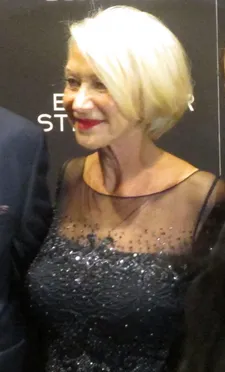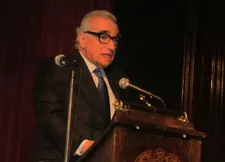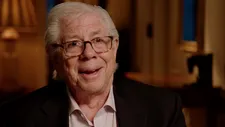_600.webp) |
| The Pulitzer At 100 director Kirk Simon on the man Liev Schreiber portrayed in Tom McCarthy's Oscar-winning Spotlight: "You do not mess with Marty Baron!" Photo: Anne-Katrin Titze |
Kirk Simon has assembled a grand cast (Helen Mirren, Natalie Portman, John Lithgow, Martin Scorsese, Yara Shahidi, and Liev Schreiber) plus authors, journalists, composers and photographers (including Paula Vogel, Toni Morrison, David Remnick, Wynton Marsalis, Tony Kushner, John Adams, Carl Bernstein, Nicholas Kristof, Jeffrey Eugenides, Thomas Friedman, Michael Cunningham, John Adams, Michael Chabon, Martin Baron, Junot Díaz, Ayad Akhtar, Robin Givhan, Sheri Fink, John Filo, Nick Ut, and Robert A. Caro) who have won Pulitzers, to create a vivid portrait of the importance of Joseph Pulitzer's brilliant idea to establish the School of Journalism at Columbia University and award prizes.
 |
| In The Pulitzer At 100, Helen Mirren has a Long Day's Journey Into Night with Eugene O'Neill Photo: Anne-Katrin Titze |
The Pulitzer At 100 celebrates a number of those honoured in the past through an impressive series of readings, news clips, photographs, and discussions. Simon's documentary also provides an historical perspective on the legacy of their contributions to the arts and sheds light on the life of the man who started it all.
Anne-Katrin Titze: You had a lot on your hands with The Pulitzer At 100. There must have been drastic omissions you started out with?
Kirk Simon: In terms of dealing with the material from the beginning I made a decision that we would work primarily with living artists. I feel that one of the greatest resources are living artists. To be able to watch people, hear them read their own work is fascinating. So the film does concentrate on the last 50 years, which is a large brush of history.
But you can't ignore the first 50 years. So that's where a second element, some actors, which turned into A-list actors, read work from earlier in the century on through. And then there's a third element, which is the story of Joseph Pulitzer himself.
AKT: Which is not very well-known.
KS: Which is, one not very well-known, two, kept at a minimum because you could turn that into a Joseph Pulitzer biography and the purpose of this film was not to do that but to honour the artists.
AKT: Long Day's Journey Into Night got two spots.
KS: Yeah, it's O'Neill!
AKT: Because you love it so much?
KS: One, I love it so much and two, early on we circulated a list of maybe 20 possible reads to the talent. And people love O'Neill.
 |
| John Lithgow reads from Philip Roth's American Pastoral and Robert Frost |
AKT: So both Helen Mirren and John Lithgow chose it?
KS: Yes, and Lithgow is a distant relation to Robert Frost.
AKT: I wanted to compliment you on that choice. The first time an actor reads, it is Lithgow reading Frost.
KS: I had thought a request to Lithgow would be acceptive because he had produced a CD where he convinced other actors to read Robert Frost. And if you've been through that - begging people, "please read for me," I would assume you'd say yes and read Robert Frost. You can't have endless Robert Frost, so he read perhaps the most famous poem and then read some other things. He is a pro. The pros come in, sit down, and they have it perfect.
AKT: Did you pick the other excerpts that the actors were reading? The one from Philip Roth's American Pastoral [read by John Lithgow] about identity and loneliness is very poignant. Did you pick that?
KS: Yes. I will claim I picked it and I will claim I didn't pick it. Meaning it was presented on a platter. 20 things are read, there were choices given of 40. So there were twenty good pieces not taken. Lithgow, although he is such a pleasant man and happy fellow, is a really great meanie. You've seen the films?
 |
| On scheduling Martin Scorsese: "We went back and forth until he found a couple of things that he was satisfied with." Photo: Anne-Katrin Titze |
AKT: Sure.
KS: Now I will also say, since you're asking, Marty Scorsese says yes to a hundred things and then it's a matter of actually scheduling him. I had no idea if we were actually going to get him in front of the camera because he spent weeks saying "lets do this and this and this" and then he'd write back a day later "I don't want to do that!" And we went back and forth until he found a couple of things that he was satisfied with.
AKT: You have him read an excerpt, followed by the author…
KS: Michael Chabon.
AKT: Right. It's nice that you break your own rules that were established for this documentary.
KS: There are two things. If you're a dull person like me and you go to writers' readings, they always have two or three pieces that they read of their work and they read them very well because they've been traveling from college campus to college campus, reading these things for one year, five years, ten years. So if you ask someone like Michael Chabon, "do you have a piece?" He goes, "here, this is the piece I like to read." Almost all the authors had a piece they would like to read.
 |
| On Watergate journalist Carl Bernstein: "He knew exactly what he wanted to read." |
I got a chuckle, I asked Carl Bernstein, "would it be possible to read from your work?" [Bernstein:] "Sure, sure, just give me whatever you have!" At the end of the interview, I had a little stack of papers with excerpts. And he looked at it and then went to the next page and then he goes: "You don't have October 21?" So he knew exactly what he wanted to read.
AKT: There is always the question of being a witness to something horrific, especially with photography. Does the person help or take a photo? What if there is a conflict? There is almost something like guilt that some of the journalists express for winning a prize for reporting someone else's hardship. They say they would gladly give back the prize if the disaster could be erased.
KS: With this film, decisions had to be made early on. One could have tried to do a checklist of a story from every year. In 90 minutes, say give a minute to every year or I preferred to make the choice to sometimes spend five or ten minutes and going more in depth and seeing different points of view that you just don't hear about.
 |
| On Sheri Fink, two-time Pulitzer winner: "She'll spend three months in Africa going into the unit every day to bring back a story to The New York Times ..." |
A writer [Carol D. Leonnig] for The Washington Post telling about the Secret Service, you also hear from Marty Baron, who is one of the great editors of newspapers.
AKT: And whom more people are now aware of since Spotlight won the Oscar.
KS: And more people know because Trump picked a fight with the wrong guy. You know, banning The Washington Post from White House press conferences was probably not the best move from Donald Trump. Remember, this is a guy, Marty Baron is a guy who told the Pope to fuck off. Donald Trump is not going to scare him.
AKT: He doesn't seem to be scared of anything. Was that your impression when you talked to him?
KS: You do not mess with Marty Baron!
AKT: Who else do you not mess with?
 |
| Liev Schreiber as Marty Baron in Spotlight |
KS: There are certain people who you just know are dogged. You know Carl Bernstein is going to get the story. Nick Kristof is going to go there and get the story. Sheri Fink, who has won two Pulitzer Prizes, is maybe 5 foot 4, 100 pounds. And she'll spend three months in Africa going into the unit every day to bring back a story to The New York Times - don't mess with Sheri Fink!
Coming up - Kirk Simon on Joseph Pulitzer, Natalie Portman in Paris, Liev Schreiber, Paula Vogel, Tony Kushner, Toni Morrison, Jeffrey Eugenides, photographer Nick Ut with Kim Phuc, Michael Cunningham from Who's Afraid of Virginia Woolf? to The Great Gatsby, Walter Hill's The Warriors, and what's in a Tiffany box in our conversation on The Pulitzer At 100.
The Pulitzer At 100 opens in the US on July 21.





















